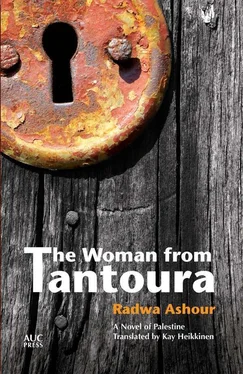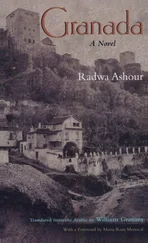“And they came to Sidon?”
“The Lebanese put them with others in an army barracks for a year or more, in an area named Qaroun, then they moved them to Ain al-Helwa.”
“It’s the first time anyone from the village has taken a woman from Saffurya.”
She went back to her questions, “Is her hair soft or rough, like the neighbors’ daughter’s?”
I laughed. “I haven’t touched it, Aunt, I don’t know. It looks soft. She braids it. Will you have coffee with me?”
She sighed. “Yes, I’ll have some.”
I gave her Hasan and got up to go to the kitchen and boil the coffee. I was suppressing my laughter. It seemed more like a judicial inquiry — why didn’t she wait two days and see her son’s bride for herself? She couldn’t wait. My poor aunt dreaded having a strange girl move in with her, sharing her house and her kitchen and her son. She kept saying, “If we were in the village Ezz would have married one of the girls there, or he would have taken one of the girls from Ain Ghazal or Ijzim or Jabaa, our maternal relatives. We’ve married among them before and their customs are like ours. Saffurya? I’ve never heard of that town and I don’t know a thing about it. God protect us!” She was openly worried. As for my uncle, I did not understand the reason for his distress on the way to Ain al-Helwa to ask for the girl. What was upsetting him? Asking for a bride for his son from strangers he had never met, or missing his brother and relatives from the village, the customary large group that accompanies the groom when he goes to ask for the bride? Or did he dread going to the camp?
Perhaps he was not distressed, but rather something else had settled in him, like coffee after it’s boiled, when the dregs are dark and concentrated and bitter, separate from the drink and the flavor we enjoy. My uncle was merry and cheerful over the marriage of his younger son, and the thought of the bride who would live with him in his house. But when he went to ask for her on the evening of that spring day of 1957 he had to go into the camp, which he had not entered before.
After they recited the Fatiha, my uncle wanted to expedite writing the contract and celebrating the marriage, but his in-laws told him that they needed some time to send the news to their relatives in the other camps. The girl’s father leaned over to my uncle, “We have to do what we must, Abu Amin. The invitation must reach everyone from the town. If they can attend then that’s good, and a blessing; if they can’t get the permits, then that’s God in his wisdom.”
“What permits?”
“Slowly, slowly, Abu Amin. We have to get a permit from the Second Bureau to allow our guests to enter the camp, a hand-written permit. We’ll submit the request tomorrow morning. Our guests also have to submit requests to get permits to leave their camps, and praise God, the people of Saffurya are many, scattered from Ain al-Helwa to Mieh Mieh to al-Burj al-Shamali near Tyre, to Wavel in the Beqaa and Nahr al-Bared in the Tripoli region. We have to contact them to find out what their situation is and when they can get the permits.”
I was not present for this part of the talk since I was in an inner room, changing Hasan’s diaper. But Ezz accompanied Amin and me on our way home in the evening, telling his mother and father that he wanted to stretch his legs a bit. When we arrived he said, “I want a cup of coffee from Ruqayya’s hands,” and he went up with us. He was burning to talk. He repeated the bride’s father’s words to me, and looked at Amin, “You noticed how discouraged everyone became.”
“I noticed, and I didn’t entirely understand what happened. I tried to distract them by talking about the agency’s projects for better health care for families, and how I hope to organize training sessions to prepare young people to administer first aid, something that could possibly turn into a nursing school later on. They were interested, in fact, but Mother was still upset.”
“Father was discouraged when Abu Karima talked about the permits, not because he hadn’t heard about them before but because every time he heard about them, he decided to drop the matter and forget about it, as if he had never heard of it. Suddenly he finds that his son’s wedding and the preparations for it depend on permits from the Lebanese military intelligence. He’ll be forced to live with the details, so how can he let it drop?”
“And what’s bothering Mother?”
I joined in, “Aunt is worried that the bride’s family will be larger than the groom’s, as if we had no extended family around us. I heard her saying to my uncle, “Why don’t you send for the people from Tantoura in Syria? Maybe some of them would be able to make the trip.”
Ezz laughed, and said, “Mother whispered in my ear, ‘Who will cook for all these people? What if a hundred people came — we’re not at home and I only have Ruqayya and our neighbor, who’s ill, and her daughter, and I can’t understand her.’ So I whispered, ‘Don’t worry, we’ll arrange things later. We shouldn’t whisper something that might reach the ears of our guests.’ She whispered back, ‘They have relatives that are coming from the Beqaa and from Baalbek. What if they turned out to be a thousand, what would I do?’ So I got up and sat in another place!”
Ezz burst out laughing, and got up.
“I’ll go home and reassure them before they go to sleep. I really needed to talk about that sudden anxiety; I couldn’t sleep without talking about it. I’ve gotten it off my chest and now I’m relaxed. Good night.”
Some of the people got their permits and some didn’t. Most of those who were invited from Tripoli and the Beqaa weren’t able to participate in the wedding, so my aunt wasn’t obliged to cook for a thousand people. Despite her constant worry she was singing and humming and welcoming the guests. They bridged the distance from the bride’s house and the surrounding houses, where her family and relatives lived in the camp, to my uncle’s house in old Sidon. The young men set up the dabka circles in the camp and in Sidon, where the people of the neighborhood shared in the dabka and the call and response of the ataba, miijaanaa, and ooof songs. Even the wedding procession was held according to custom. My uncle brought a horse from one of his friends; they decorated it and Ezz rode it, after his friends had taken him to the public bath and sung the customary songs to him: “The handsome young man comes from the bath, God and his names protect him,” and “O you with the kufiyeh and cords, where did you hunt this gazelle?” I sang with my aunt and the bride’s mother and sisters:
Say to his mother, rejoice and be glad,
Perfume the pillows and bring henna for our hands.
The wedding is here and the couple is smiling,
The home is my home and the houses are mine—
We are engaged, let my enemy die!
Little Sadiq was clapping his hands and joining in the singing.
My aunt outdid herself when she sang Ya Zareef al-Tuul —O Tall One. She added some lines to the familiar song which I had not heard before:
O tall one, O handsome, stop and let me say,
You’re going abroad, when your country would be best.
I’m afraid, O tall one, that you’ll settle there,
You’ll live with another, and let my memory go.
O tall one, O handsome, you with the laughing smile,
Tenderly raised by your mother and father,
O tall one, the day they took you far away
My hair went white and my back bent low.
O tall one, O handsome, you’re far from your own.
Don’t travel far away and leave us the blame!
If God wills you’ll return, we’ll return to the vines,
We’ll harvest the wheat, and gather what we grow.
Читать дальше












